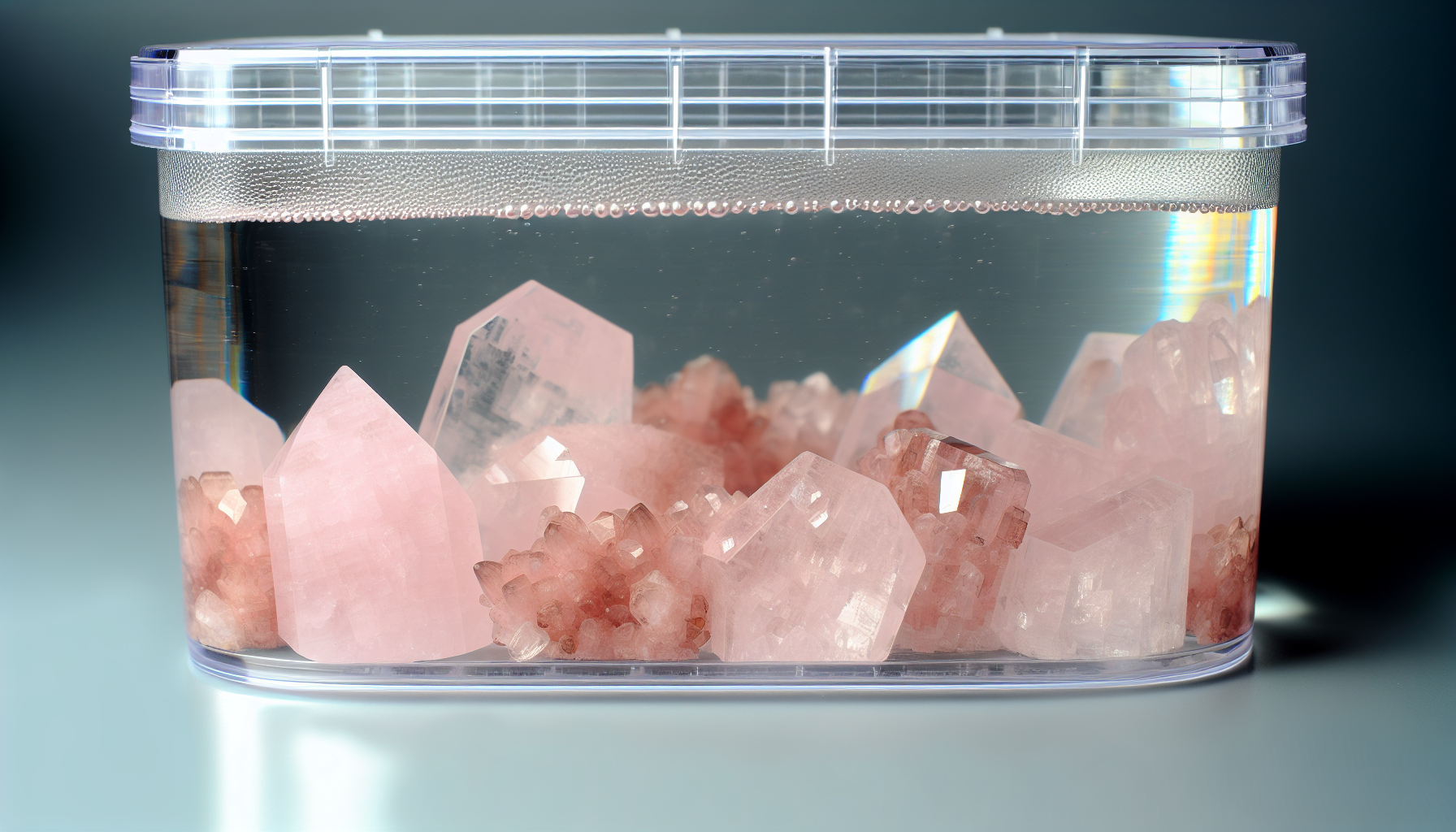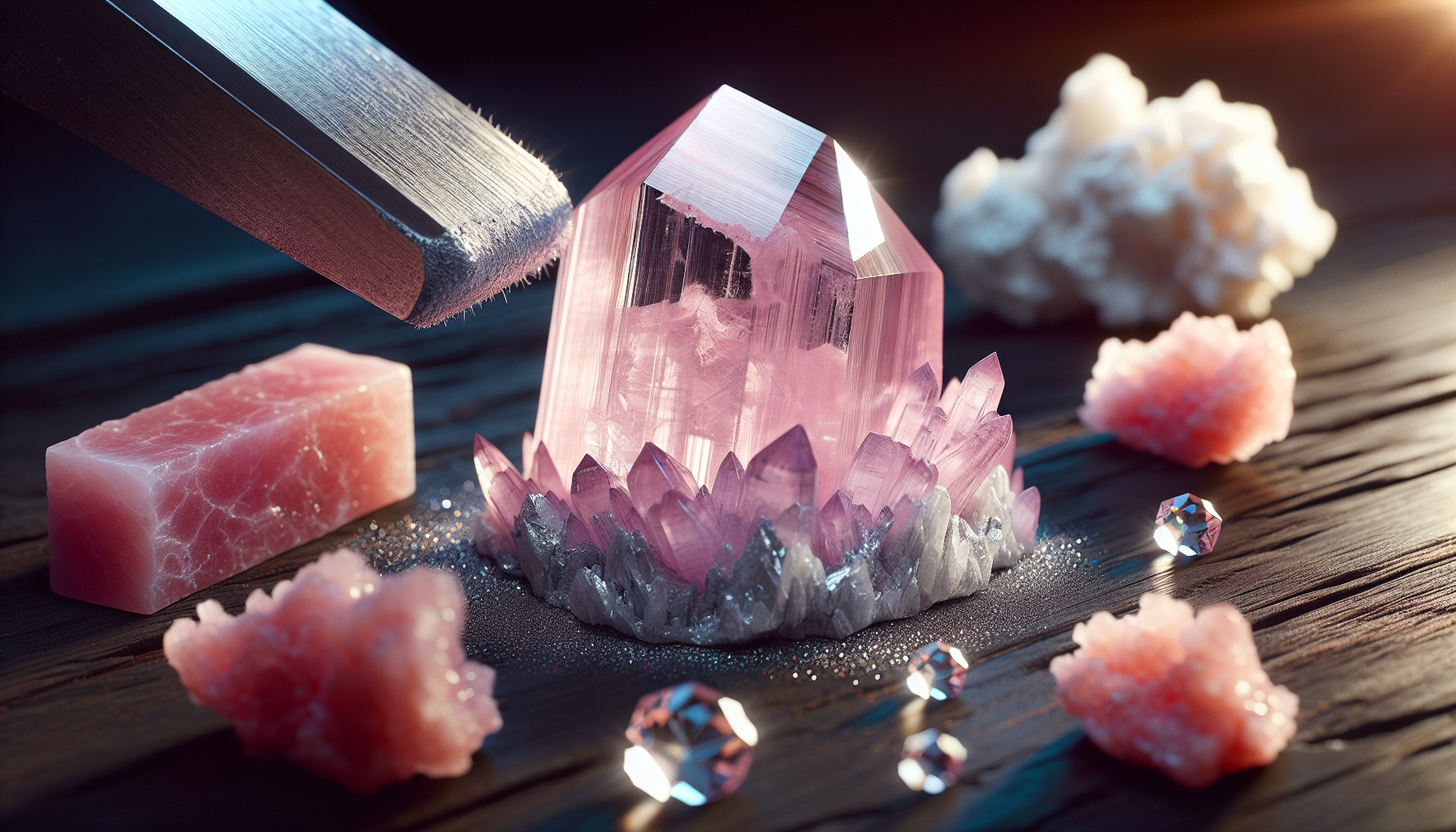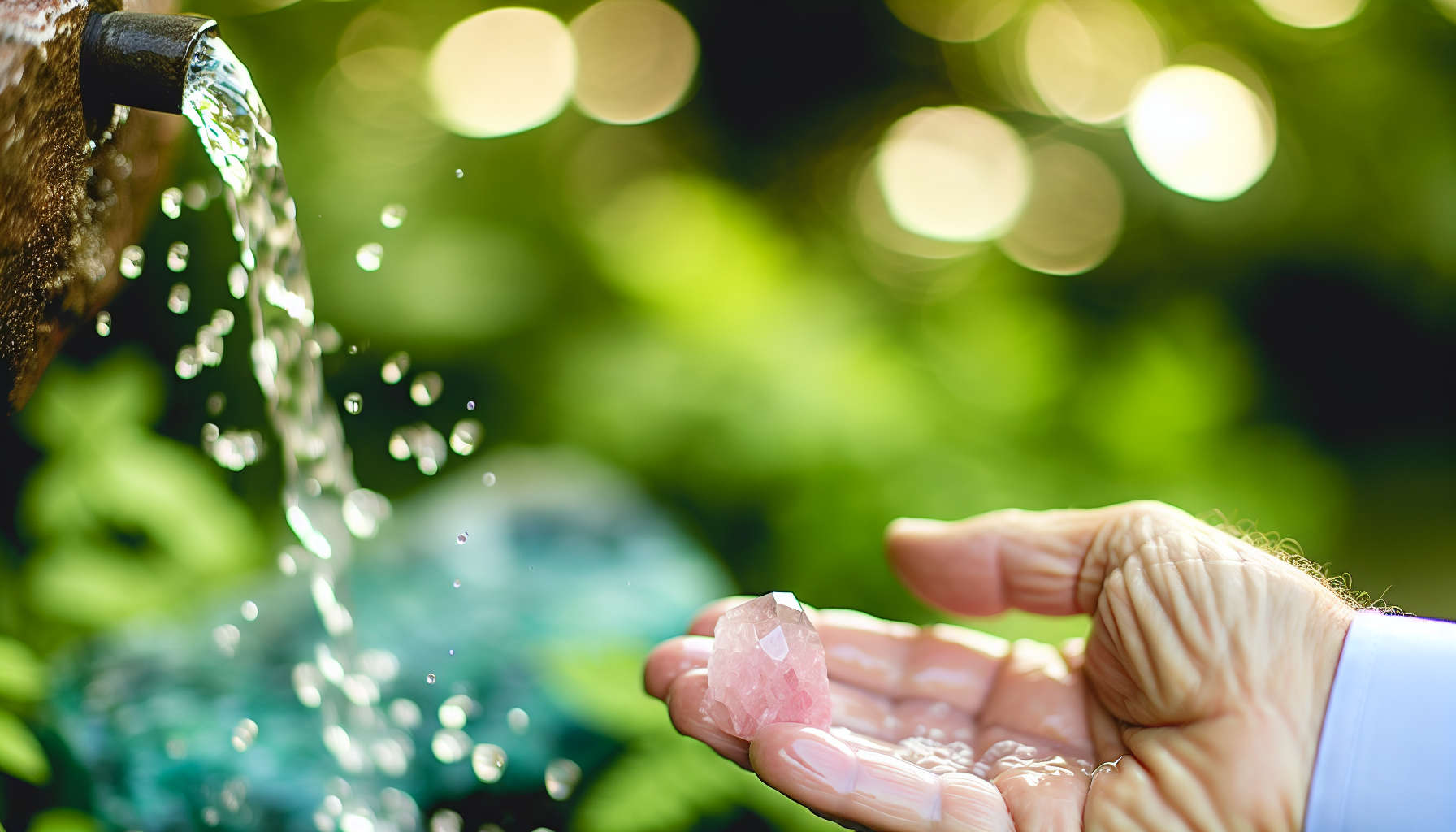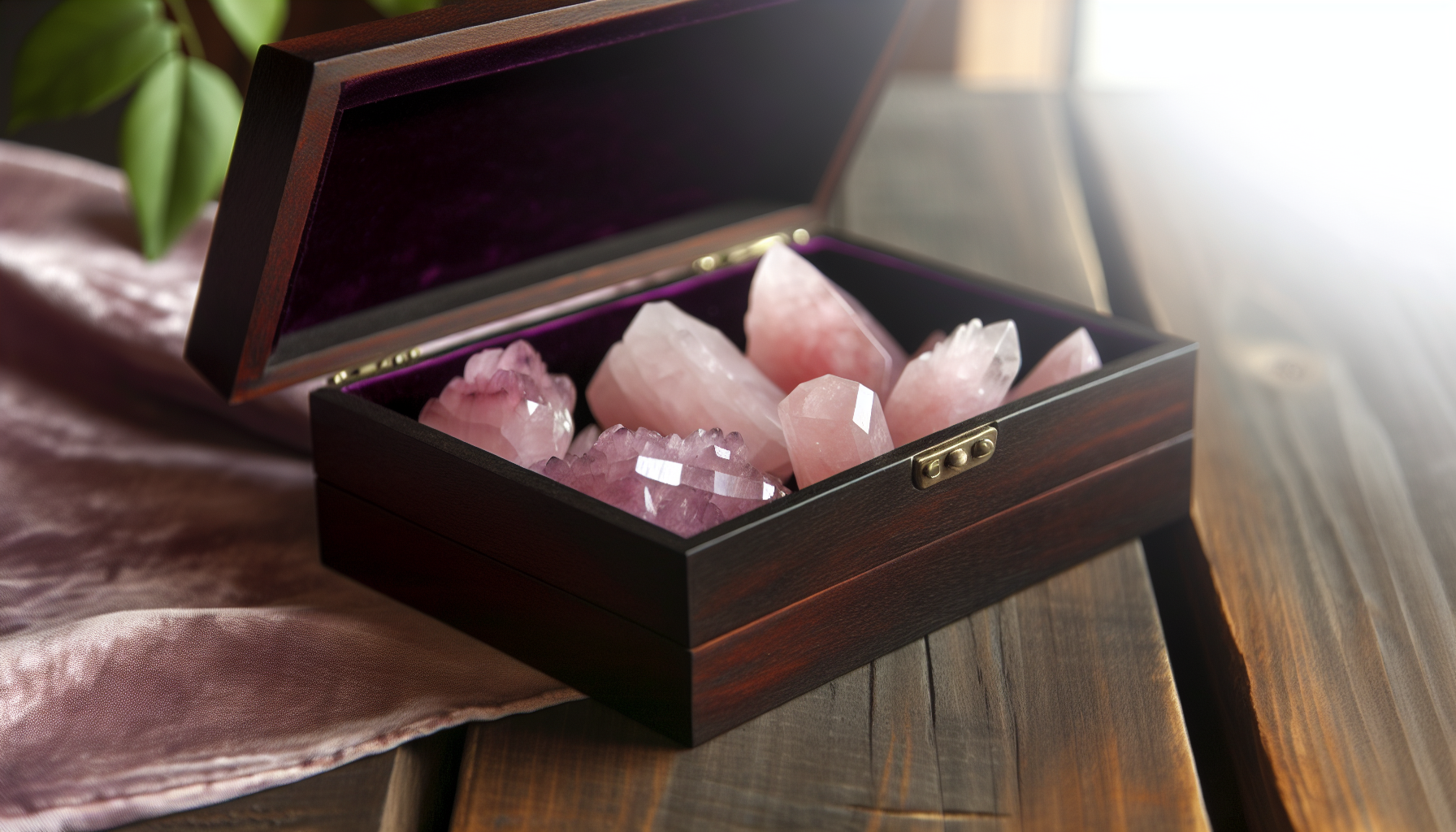Rose Quartz is generally considered safe to put in water due to its Mohs hardness of 7, but prolonged exposure should be avoided to maintain the crystal’s integrity and appearance. Salt water can be corrosive to Rose Quartz; instead, the crystal can be placed near salt for cleansing or briefly submerged in tap water, ideally filtered or distilled, to avoid dullness from mineral deposits. It’s crucial to dry Rose Quartz properly after water cleansing to avoid water damage, especially in natural fissures, and alternative methods like moonlight, smudging, and sound vibrations can also be used for cleansing.
Wondering if your cherished “can rose quartz go in water”? The good news is that with a Mohs hardness of 7, rose quartz is resilient enough for brief water exposure. However, understanding the right way to introduce water to this beloved crystal is key to maintaining its pristine condition and energetic qualities. In this guide, we’ll explore what safe water interaction means for your rose quartz, encompassing everything from quick rinses to avoiding potential hazards like prolonged soaks or saltwater immersion.
Is Rose Quartz Water Safe?
Rose Quartz is considered safe for water exposure due to its hardness of 7 on the Mohs scale.

Rose Quartz, with its Mohs hardness of 7, is generally considered safe to put in water. This quartz crystal has been used traditionally in meditation practices to promote inner peace and calmness, suggesting that water may be a compatible companion in these practices. Moreover, Rose Quartz is seen as having healing properties that can help calm and soothe emotions, indicating that water may be used as part of its cleansing without harming the stone.
Nonetheless, caution is advised when using water to cleanse quartz stones, such as clear quartz and rose quartz. Although these crystals are safe in water, their integrity can be compromised by prolonged exposure to it. Thus, to preserve your Rose Quartz crystal’s natural beauty and energy, you must understand the correct cleansing practices.
Can Rose Quartz go in Salt Water?
Rose Quartz should not be placed in salt water as it can erode and damage the crystal.
While Rose Quartz can technically be cleansed with salt due to its Mohs hardness score of 7, it may not be the best idea to soak this crystal in salt water. Salt water can be corrosive and may cause damage to the stone over time. Therefore, it’s advisable to avoid this method when looking to cleanse your Rose Quartz crystal.
As an alternative to soaking, consider placing your Rose Quartz near a dish of rock salt or sprinkling some salt around it. This way, you can still harness the purifying properties of salt without risking any potential damage to your crystal.
Can Rose Quartz go in Tap Water?
Rose Quartz can be briefly rinsed in tap water but should not be soaked to prevent dullness.
You might be wondering if tap water is safe for your Rose Quartz. Yes, Rose Quartz can be briefly cleaned in tap water. However, keep in mind that frequent exposure to tap water may cause your Rose Quartz to lose its luster and become dull over time. This is because tap water often contains various minerals and chemicals that could react with the surface of your quartz stone.
Given its hardness rating of 7 on the Mohs scale, Rose Quartz can withstand brief contact with tap water without immediate harm. But to maintain its shine and vibrancy, it’s best to use filtered or distilled water for cleansing. This way, you can avoid potential chemical reactions while ensuring a thorough cleanse with your crystal water bottle.
Can Rose Quartz go in Salt?
Rose Quartz can be placed near salt for cleansing, but direct contact should be brief to prevent damage.
Salt is a common method for cleansing and re-energizing various types of quartz crystals. It is used to remove negative energy from the environment, and this property can be utilized to cleanse Rose Quartz without water.
However, it’s important to not leave your Rose Quartz in direct contact with salt for too long. Excessive exposure might cause damage to the crystal. Hence, after a salt cleanse, always remember to carefully remove all salt residues from your crystal to avoid any potential harm.
Can Rose Quartz go in the Sun?
Rose Quartz should not be placed in direct sunlight as it can cause the color to fade.
Sunlight, while a source of life-giving energy, can have adverse effects on your Rose Quartz. Prolonged exposure to sunlight can cause Rose Quartz to fade, so it’s best to keep your stone away from direct sunlight. Exposing Rose Quartz to heat can also result in discoloration, so placing it near heat sources should be avoided.
To keep your Rose Quartz vibrant and intact, it’s recommended to store it in a clean, dry, dark area. This could be a special box, pouch, or a shaded shelf. Proper storage away from sunlight and heat is key to maintaining the natural beauty and metaphysical properties of Rose Quartz.
Rose Quartz and Water: What You Need to Know

Before deciding to cleanse your Rose Quartz with water, you should understand the stone’s composition and its interaction with water. Let’s delve into the Mohs hardness scale and the potential effects of water on Rose Quartz to guide you in caring for your crystal properly.
Mohs Hardness Scale and Rose Quartz
The Mohs hardness scale is a method used to estimate the durability of minerals, including how well they can withstand exposure to water. This scale ranges from 1 (the softest, such as talc) to 10 (the hardest, such as diamond). Rose Quartz ranks at a 7 on the Mohs hardness scale, indicating it’s relatively hard and durable, unlike some soft crystals that rank lower on the scale.
Due to its hardness rating, short-term contact with water is safe for Rose Quartz and won’t cause immediate damage. This makes it more water-resistant compared to water unsafe crystals with lower hardness ratings. Nevertheless, to preserve the crystal’s integrity, it’s advisable to avoid exposing it to water for extended periods.
Potential Effects of Water on Rose Quartz
While Rose Quartz can withstand brief immersions in water, prolonged water exposure can potentially affect the crystal in several ways. Extended soaking can lead to:
- Water penetration into any pre-existing cracks, risking further damage
- Water molecules getting beneath the stone’s surface through these penetrations, causing cracks to widen
- Eventually leading to the crystal breaking
It is important to avoid prolonged water exposure to ensure the longevity of your Rose Quartz crystal.
Moreover, long-term water contact can also cause Rose Quartz to fade or lose its shine, as it can alter the physical appearance of the crystal. Factors such as water quality, temperature changes, and natural fissures can potentially damage Rose Quartz.
Hence, when cleansing your Rose Quartz, remember to use clean water, refrain from drastic temperature changes, and thoroughly dry your stone afterward.
How to Safely Cleanse Rose Quartz with Water?

Now that you’re aware of how water can affect Rose Quartz, let’s look at how to cleanse your Rose Quartz with water safely. Here, we’ll discuss techniques such as short immersions, choosing the right water, and proper drying tips to ensure your crystal remains vibrant and energetically charged.
Short Immersions for Energy Work
Briefly submerging Rose Quartz in water is thought to purify the crystal, thereby enhancing its inherent properties such as fostering love and self-love. Water is often considered a purifying element in energy work and crystal healing, with the capability to cleanse crystals like Rose Quartz of negative energy and recharge their natural properties.
Submerging Rose Quartz in water allows the crystal to absorb the water’s vibrations and energy, contributing to an enhancement of the crystal’s positive properties. Nonetheless, to avoid potential damage to the crystal, it’s important to limit the immersion time to a few minutes or several hours, but never exceeding 24 hours.
Choosing the Right Water
The type of water you use to cleanse your Rose Quartz is as important as the cleansing process itself. To prevent potential chemical reactions that can dull the crystal’s surface, it’s advised to use filtered or distilled water rather than tap water for cleansing Rose Quartz.
For those seeking a more natural cleansing method, using rainwater for Rose Quartz is ideal due to its purity and gentle quality on the stone. Natural sources of water such as spring water can also be used, especially if you’re looking to incorporate the cleansing powers of nature into your crystal care routine.
Drying Tips for Rose Quartz
After cleansing, it’s crucial to properly dry your Rose Quartz to avoid any water-related damage, especially in natural fissures or inclusions. After cleansing with water, Rose Quartz should be gently patted dry with a clean towel or fiber cloth. This will help remove any remaining water on the surface of the crystal and within its crevices.
However, avoid using heat sources like hair dryers to dry your Rose Quartz. Excessive heat can cause sudden temperature changes leading to cracks or fractures in the crystal. Instead, let your Rose Quartz air dry naturally in a warm, dry place.
How to Cleanse Rose Quartz Without Water: Alternative Cleansing Methods

Apart from water, there are other effective methods for cleansing Rose Quartz. These alternative methods can be particularly useful if your Rose Quartz has natural fissures, making it more susceptible to water damage. Here, we’ll explore cleansing methods that include:
- Moonlight
- Smudging
- Sound vibrations
- Visualization
Moonlight is a gentle and popular alternative for cleansing Rose Quartz, especially during the full moon. Incense like sage or Palo Santo can be used in a smudging ceremony to clear negative energy from Rose Quartz without water. Burying your Rose Quartz in a dish of salt or unprocessed brown rice for 24 hours is another safe and effective way to cleanse it from negative energies.
Sound vibrations from singing bowls, tuning forks, bells, or chanting are also effective in cleansing Rose Quartz crystal. Lastly, visualization and meditation focusing on cleansing energy can effectively purify your Rose Quartz without any physical substances involved. Incorporating the use of cleansing crystals, such as Rose Quartz, can further enhance your spiritual journey.
Caring for Your Rose Quartz Crystal

Proper care for your rose quartz stone includes:
- Storing it in a soft cloth or pouch to protect it from scratches
- Keeping it away from direct sunlight to prevent fading
- Avoiding contact with harsh chemicals, such as cleaning products or perfumes, as they can damage the stone
- Cleansing it regularly to remove any negative energy it may have absorbed
Remember, the better you care for your Rose Quartz, the longer it will maintain its beauty and healing properties.
Let’s examine some recommendations for storing your Rose Quartz and precautions to take to maintain its integrity.
Storing Rose Quartz
When it comes to storing your Rose Quartz, organization and protection are key. Here are some tips for storing your Rose Quartz:
- Sort your Rose Quartz by type, size, or color.
- Label the containers to easily identify your crystals.
- Consider using special containers or boxes that protect your crystals from dust and damage.
By following these tips, you can ensure that your Rose Quartz is stored in an organized and protected manner.
For those who wish to display their crystals while keeping them protected, terrariums are an excellent option. They not only protect Rose Quartz crystals from dust and dirt but also allow for the crystals to be admired and their energy felt, even while in storage. Elevating Rose Quartz on pedestals for display can minimize dust accumulation and enhance the crystal’s visual appeal, contributing to both its protection and enjoyment.
Avoiding Direct Sunlight and Heat
While ensuring your Rose Quartz crystal is clean and properly stored is vital, it’s equally important to consider the environment where it’s kept. Prolonged exposure to direct sunlight can cause Rose Quartz to fade and lose its pink hue. Hence, it’s recommended to store it in a place that isn’t exposed to direct sunlight.
To keep your Rose Quartz vibrant and intact, follow these storage tips:
- Store it in a clean, dry, dark area, such as a special box, pouch, or a shaded shelf
- Avoid placing it near heat sources to prevent discoloration
- Keep it away from sunlight to maintain its natural beauty and metaphysical properties
Proper storage is key to maintaining the natural beauty and metaphysical properties of Rose Quartz.
Common Questions About Rose Quartz and Water
Many crystal enthusiasts often have questions about how Rose Quartz interacts with water. Some of these include its compatibility with salt water, tap water, and sunlight. While Rose Quartz is generally safe with water due to its Mohs hardness of 7, it’s important to be aware of the potential effects of different types of water and environmental conditions on this crystal.
Rose Quartz can technically be submerged in salt water due to its chemical composition. However, it’s usually advised against submerging Rose Quartz in salt water as it can be corrosive and potentially damage the crystal over time. If cleansing with salt water is preferred, an overnight soak in salt water made from dissolving sea salt in warm water can be used, but caution should be exercised due to potential corrosive effects.
Summary
Rose Quartz, with its alluring beauty and healing properties, deserves special care and attention. It’s crucial to understand its interaction with water and how to properly cleanse it to maintain its vibrancy and energy. While Rose Quartz is generally safe with water due to its Mohs hardness of 7, precautions should be taken, such as avoiding prolonged soaking, salt water, and direct sunlight.
Cleansing Rose Quartz can be safely done with short immersions in filtered or distilled water, followed by thorough drying. Alternative cleansing methods, such as moonlight, smudging, sound vibrations, and visualization, can also be effective. Proper storage, away from direct sunlight and heat, is also key to maintaining the natural beauty and metaphysical properties of Rose Quartz. With proper care and maintenance, your Rose Quartz will continue to radiate its calming energy and serve as a beacon of unconditional love.
Frequently Asked Questions About Rose Quartz and Water
Can rose quartz be in a shower?
Yes, you can shower with rose quartz, but prolonged exposure to water and chemicals may damage its color and integrity. Be cautious.
How do you activate rose quartz with water?
To activate your rose quartz with water, place it in a container with water and salt, and leave it for about 10 minutes. This will help restore its brightness and color.
Is rose quartz safe to put in water?
Yes, real rose quartz is safe to put in water, as most crystals have no trouble being submerged in water for long periods of time.
Can Rose Quartz go in salt water?
No, it’s generally not recommended to put Rose Quartz in salt water as it can be corrosive and may damage the crystal over time.
Can Rose Quartz go in the sun?
No, it’s best to avoid exposing Rose Quartz to prolonged sunlight as it can cause the stone to fade. Store it in a shaded area instead.